In software development, the role of an Account Executive is pivotal. Serving as a critical bridge in project management and client relations, these professionals excel in navigating the intricate interplay between technical solutions and customer needs. Their expertise in business administration and sales strategies ensures the acquisition of new clients and nurturing of lasting client relationships. With robust communication skills and a comprehensive understanding of sales team dynamics, they are vital in driving customer satisfaction and expanding the customer base.
Aloa, an expert in software outsourcing, understands the multifaceted challenges businesses face. By leveraging its team's extensive knowledge of public relations and sales skills, Aloa aids companies in enhancing their sales strategies and managing client accounts. This approach is integral in developing effective action plans, whether senior or junior, and can contribute significantly to the growth potential of both new business and existing client accounts.
This blog provides a comprehensive overview of an AE's job description. From requiring a bachelor’s degree in a related field to proficiency in public speaking for engaging prospective clients, it details the qualifications necessary for excelling in this executive role. Afterward, you will understand the diverse responsibilities, from overseeing junior account executives to devising strategies for new business acquisitions.
Let's dive in!
What is an Account Executive For Software Development?
An Account Executive for Software Development is a professional combining management skills with technical insight. They liaise between team members and clients, ensuring projects meet customer expectations. These executives excel in presentation skills, customer service, and active listening, acting as pivotal sales representatives.
The ideal candidate often has extensive customer support and work experience, potentially as a senior account executive or manager. A successful candidate demonstrates proficiency in meeting sales quotas and possesses the necessary skills to thrive in the United States market.
Key Responsibilities of an Account Manager for Software Development
In software development, an Account Manager plays a pivotal role in bridging the gap between client expectations and the technical team's capabilities. Their multi-faceted responsibilities encompass client relationship management, project oversight, and strategic planning.
Here are five critical responsibilities of an Account Manager in this domain.
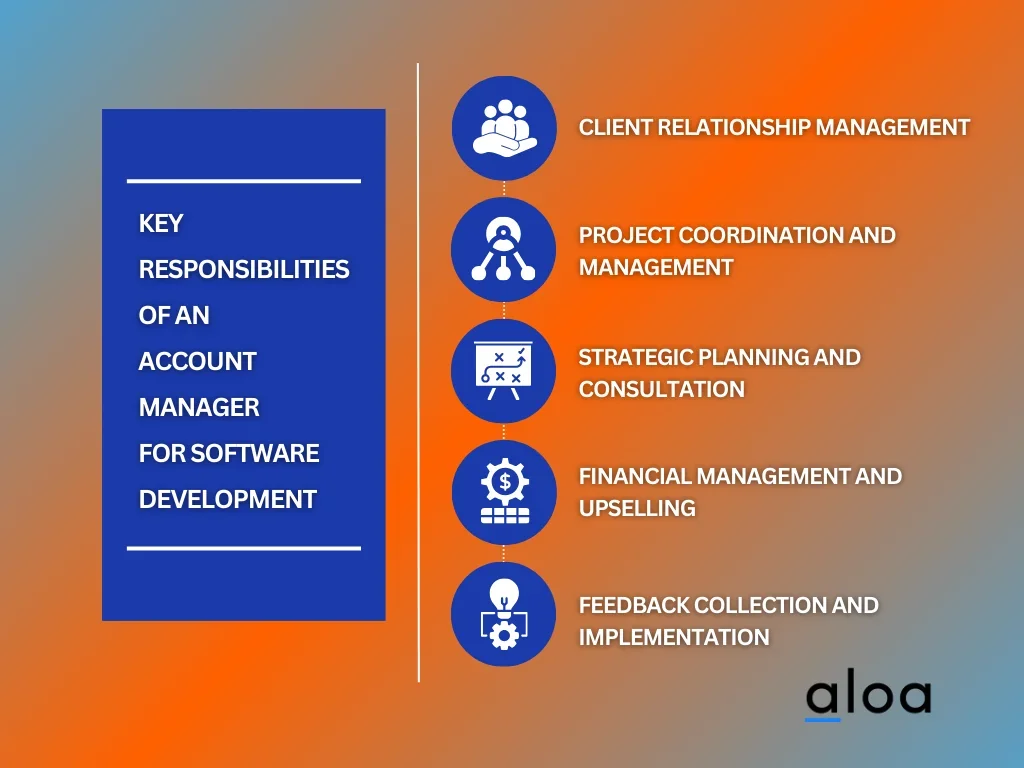
Client Relationship Management
The foremost duty of an Account Manager is to maintain and nurture relationships with clients. This involves regular communication, understanding client needs, and ensuring service satisfaction. They act as clients' primary point of contact, addressing concerns and providing updates on project progress. Building trust and rapport they help retain clients and foster long-term partnerships.
Project Coordination and Management
Account Managers oversee the entire lifecycle of software development projects. They coordinate with various teams – developers, designers, and quality assurance – to ensure the project meets client requirements and timelines. This role requires them to be adept in project management tools and methodologies, enabling them to track progress, manage risks, and ensure timely delivery of the final product.
Strategic Planning and Consultation
Providing strategic advice to clients is a crucial aspect of this role. Account Managers must understand the latest trends in software development and advise clients on the best solutions to meet their business objectives. They play a consultative role, helping clients navigate through technical options and making recommendations that align with the client's long-term strategy.
Financial Management and Upselling
Account Managers are responsible for the financial aspects of projects, including budgeting, billing, and contract negotiations. They ensure that projects remain profitable while meeting client expectations. Additionally, they identify opportunities for upselling or cross-selling services that would benefit the client, thus contributing to revenue growth.
Feedback Collection and Implementation
An essential responsibility is gathering client feedback and translating it into actionable insights. Account Managers collect feedback on project deliverables, client service experience, and overall satisfaction. This feedback is crucial for continuous improvement, helping to refine processes, enhance service quality, and meet evolving client needs more effectively.
How to Hire an Account Executive For Your Software Development Project
Finding the right Account Executive for your software development project is crucial. They bridge your company and its clients, ensuring project requirements align with business goals. Here's a step-by-step guide to help you through the process:
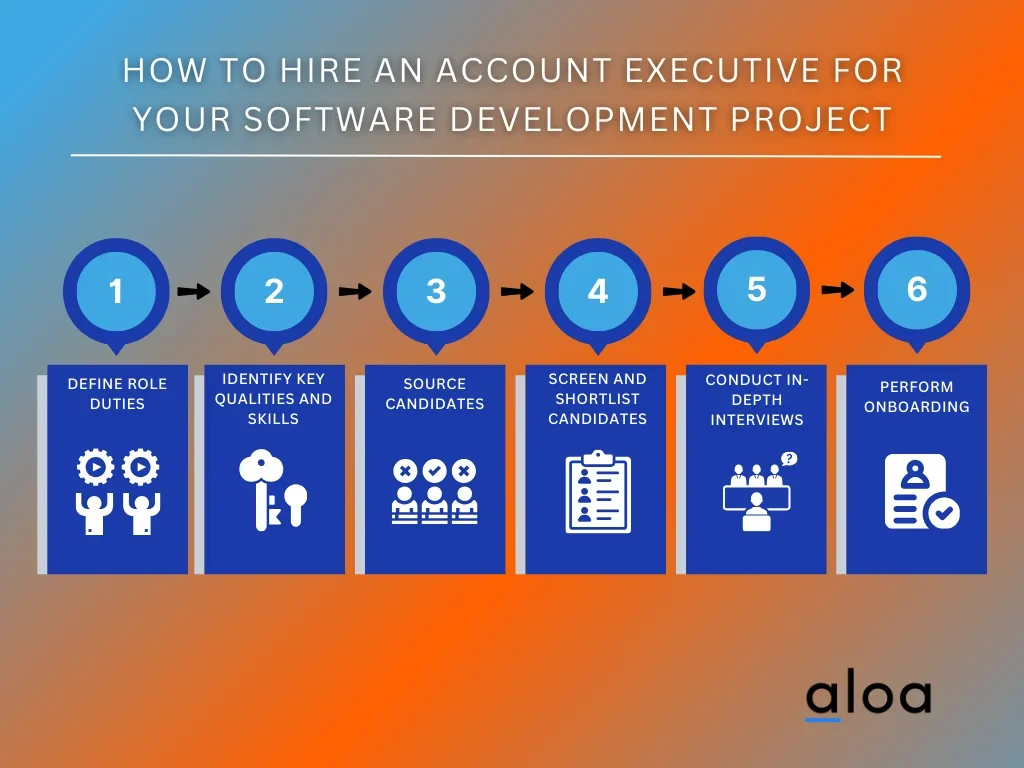
Step 1: Define the Role and Responsibilities
Before launching your search for an Account Executive, it's critical to clearly define the role and its responsibilities, especially within the dynamic field of software development. This role involves managing client accounts and being a key player in your project's success. Here’s how you can break down the responsibilities:
- Developing and maintaining solid relationships with clients.
- Understand client needs and communicate these to the development team.
- Managing project timelines, budgets, and deliverables.
- Identifying new business opportunities and contributing to sales strategies.
You define these responsibilities in detail by establishing a comprehensive framework for the Account Executive role. This clarity will help create a focused job description and set explicit expectations for candidates. It enables you to communicate the depth and breadth of the role, ensuring that applicants clearly understand what will be expected of them.
Step 2: Identify Key Qualities and Skills
Finding the right Account Executive for your software development project involves identifying candidates with a blend of technical and interpersonal skills. These qualities are essential for managing client relationships, navigating project intricacies, and driving business growth. Here’s a deeper look into the essential qualities and skills to look for:
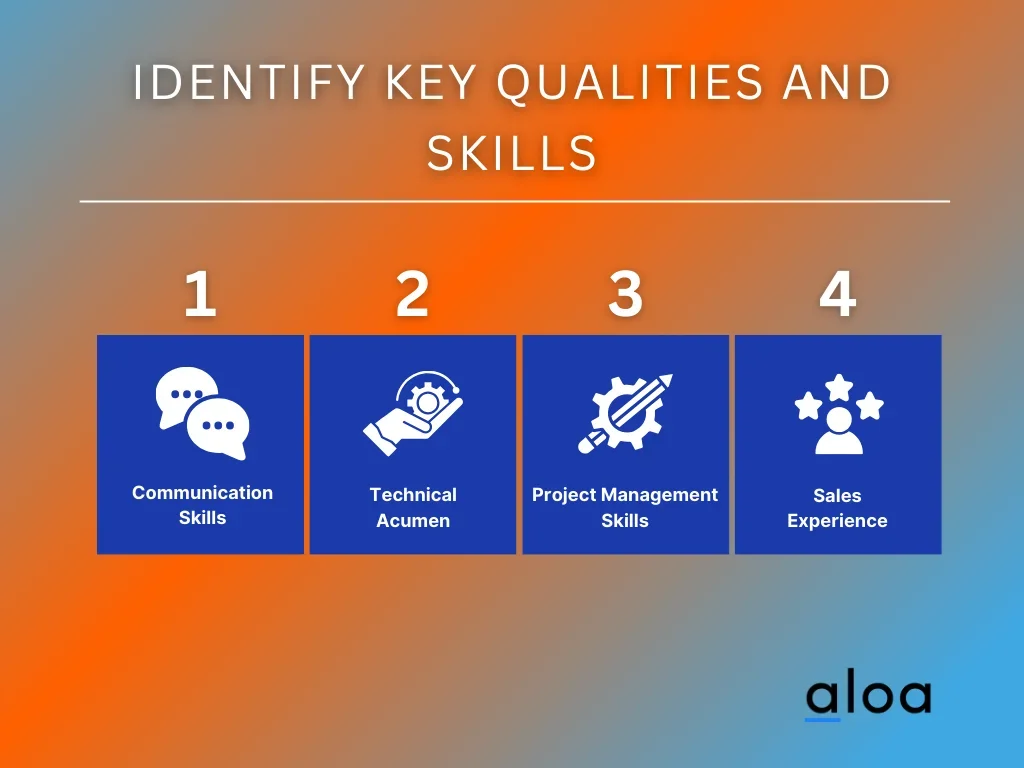
- Communication Skills: Excellent verbal and written communication skills are crucial for managing client relationships effectively.
- Technical Acumen: While they must be more experienced, a good understanding of software development processes and jargon will help them liaise effectively between clients and technical teams.
- Project Management Skills: Experience in managing projects, including budgeting and resource allocation, is vital.
- Sales Experience: Proven experience in sales, particularly in the tech industry, can be a significant advantage.
An Account Executive in software development needs a unique combination of communication prowess, technical understanding, project management expertise, and sales acumen. These skills enable them to bridge the gap between technical teams and clients, ensuring projects are delivered successfully, and client relationships are nurtured for long-term collaboration.
Step 3: Source Candidates
To find the best candidates for the role of Account Executive in your software development project, it's essential to cast a wide net across multiple sourcing channels. Start by utilizing online job portals to post detailed job listings and attract diverse applicants. These platforms allow you to reach a broad audience and are particularly effective for targeting professionals actively seeking new opportunities.
Consider partnering with platforms like Aloa, which specialize in vetting and providing top-tier talent specifically for software development roles. Aloa’s rigorous vetting process ensures that candidates possess the necessary technical skills and align with your organization's specific needs and culture. By combining these various sourcing methods, you can effectively widen your talent pool and increase your chances of finding the ideal candidate for the Account Executive position.
Step 4: Screen and Shortlist Candidates
Once you've gathered a pool of applications, the critical process of screening and shortlisting candidates begins. This phase is essential in narrowing down the applicants to those most likely to excel in the role. After collecting applications, the next step is to screen and shortlist candidates.

- Resume Review: Look for relevant experience, particularly in software development or a related field. Pay attention to their achievements and the scale of projects they have managed.
- Cover Letter Evaluation: A well-written cover letter can provide insights into a candidate’s communication skills and enthusiasm for the role.
- Initial Phone Screen: A brief phone interview can help you assess their communication skills and verify the details on their resume.
By meticulously evaluating resumes and cover letters and conducting initial phone interviews, you can confidently create a shortlist of potential candidates well-equipped for the challenges and opportunities of the Account Executive position in software development.
The Aloa vetting playbook is an indispensable resource for ensuring the highest quality in every aspect of your projects. This outlines a meticulous process for evaluating potential account executives. It covers thorough background checks, technical assessments, and compatibility analyses to guarantee you make the right choices.
Step 5: Conduct In-Depth Interviews
Conducting in-depth interviews is a critical stage beyond the essential screening of candidates. It involves a deeper dive into the candidate's capabilities, experiences, and alignment with your company's values and culture.
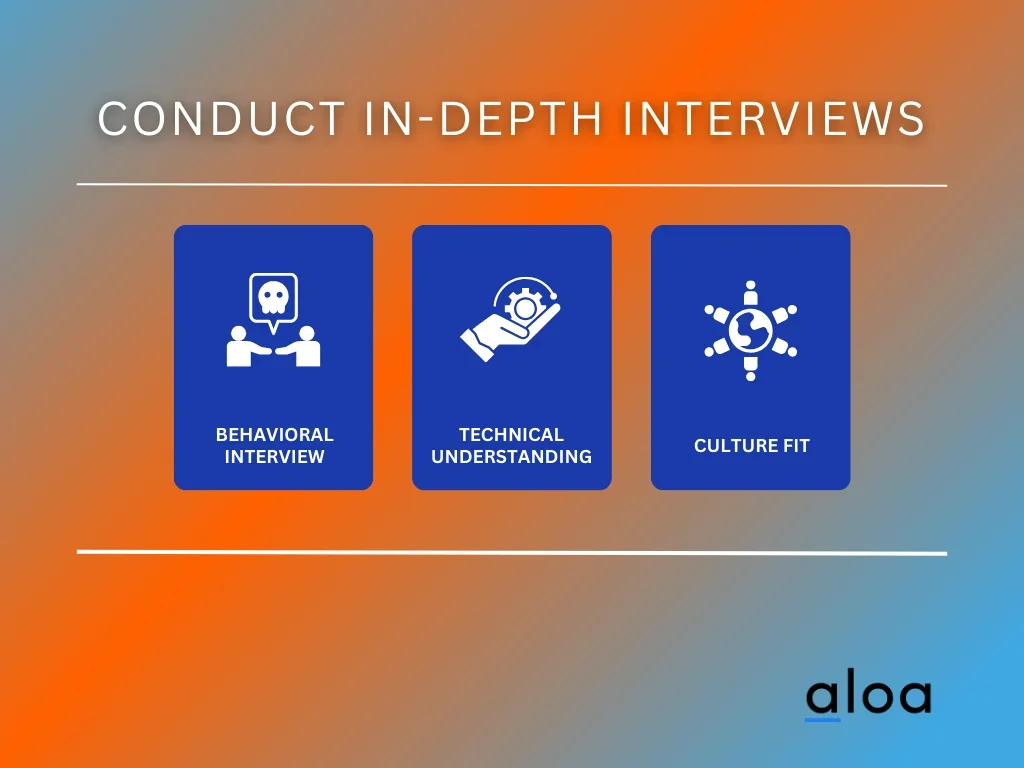
- Behavioral Interview: Ask questions about how they have handled past situations relevant to the role. This can provide insights into their problem-solving and interpersonal skills.
- Technical Understanding: Discuss their understanding of software development processes to gauge their ability to communicate effectively with clients and technical teams.
- Culture Fit: Assess whether their values and work style align with your company's culture.
In-depth interviews are integral to selecting the right candidate for an Account Executive role. They allow you to thoroughly assess the candidate's behavioral tendencies, technical understanding, and cultural fit, ensuring that you choose someone who is not only capable of performing the job effectively but also complements and enhances your existing team and company environment.
Step 6: Perform Onboarding
Performing onboarding is the final and crucial phase in integrating your new Account Executive into the team. This process should be structured and comprehensive, ensuring the new hire is well-acquainted with your company's culture, processes, and expectations. Introduce them to key team members and stakeholders they'll be working with.
Provide them with detailed information about your software development projects, client profiles, and company goals. Organize training sessions to familiarize them with your project management tools and software platforms. Regular check-ins during the first few weeks help address concerns and facilitate a smooth transition into their new role.
Essential Skills to Look for an Account Executive For Software Development
When hiring an Account Executive for Software Development, it's crucial to identify candidates with a blend of technical and soft skills. These skills ensure they can effectively manage client relationships and navigate the complexities of software projects.
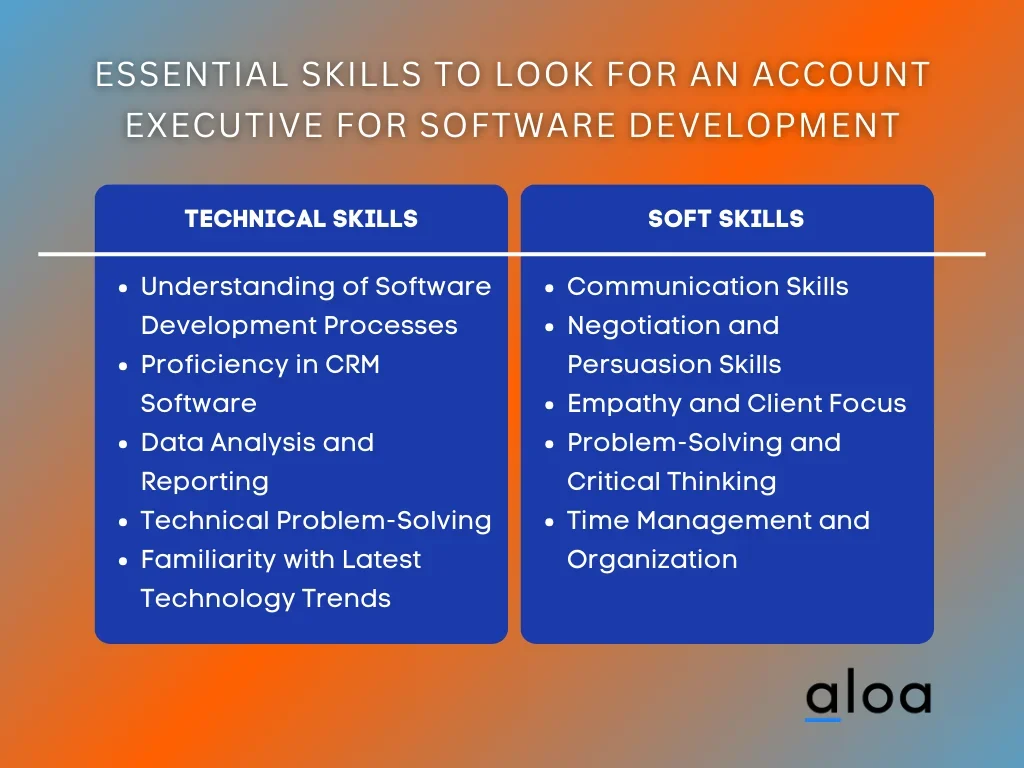
Technical Skills
Technical skills are the bedrock of an Account Executive's competence in the software development industry. These skills enable them to understand project requirements, communicate effectively with the technical team, and provide accurate information to clients.
- Understanding of Software Development Processes: Knowledge of agile methodologies, software lifecycle, and project management tools is essential. This understanding helps in coordinating with developers and managing client expectations.
- Proficiency in CRM Software: Experience with Customer Relationship Management (CRM) software is vital. It allows efficient client interactions, sales processes, and leads management tracking.
- Data Analysis and Reporting: Analyzing data and generating insightful reports is crucial. This skill helps evaluate project progress, understand market trends, and make data-driven decisions.
- Technical Problem-Solving: An AE should be able to troubleshoot and provide solutions for technical issues. This skill is vital in managing client concerns and maintaining project continuity.
- Familiarity with Latest Technology Trends: Staying updated with the latest technology trends and software tools is essential. It ensures that they can advise clients on new technologies and potential upgrades.
Soft Skills
Soft skills complement technical knowledge and are essential for effective communication, team collaboration, and client management.
- Communication Skills: Exceptional verbal and written communication skills are fundamental. They ensure clear and compelling interactions with clients and team members.
- Negotiation and Persuasion Skills: They must be adept at negotiating contracts and persuading clients about the value of software solutions. This skill is crucial in closing deals and maintaining profitable relationships.
- Empathy and Client Focus: Understanding clients' needs and perspectives is vital. Empathy helps in building strong, trust-based relationships.
- Problem-Solving and Critical Thinking: The ability to think critically and solve problems creatively is vital. It enables them to handle challenges and offer viable solutions.
- Time Management and Organization: Managing multiple clients and projects requires excellent time management and organizational skills. These skills are essential for meeting deadlines and maintaining high work quality.
Potential Career Paths of an Account Executive
Account Executives in the software development field hold a pivotal role in balancing client relationships and project success. Their diverse skill set opens doors to numerous career advancements. Here, we explore five promising career paths an Account Executive might pursue, each offering unique challenges and opportunities for growth.
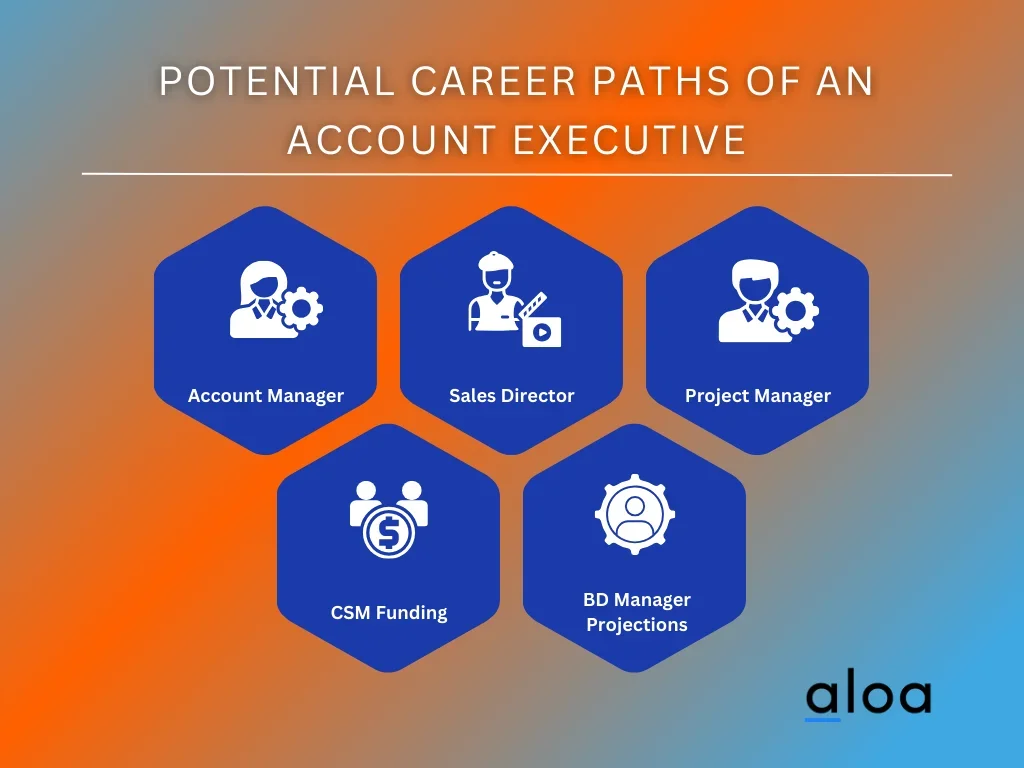
Account Manager
Transitioning to an Account Manager involves a shift from sales-focused roles to a more comprehensive client management responsibility. Account Managers typically oversee client accounts post-sale, ensuring service delivery meets client expectations and cultivating ongoing relationships. This role requires strong problem-solving skills and the ability to navigate complex client needs.
Sales Director
The position offers a significant step up for those inclined towards leadership. This role involves overseeing the entire sales department, setting sales goals, and designing strategies to achieve these targets. Sales Directors are instrumental in shaping an organization's sales culture and practices, requiring exceptional leadership and strategic planning skills.
Project Manager
An Account Executive with a knack for organization and a keen eye for detail may find a fulfilling career as a Project Manager. This role focuses on overseeing project execution, managing timelines and resources, and ensuring project objectives are met. Project Managers need strong communication skills to liaise between clients, team members, and stakeholders.
Customer Success Manager
This role is ideal for those who excel in nurturing client relationships. A Customer Success Manager ensures clients are satisfied with the services and products, aiming to enhance customer loyalty and retention. They play a crucial role in understanding customer feedback and translating it into actionable insights for the company using customer success software to optimize the customer journey.
Business Development Manager
Becoming a Business Development Manager is an ideal progression for Account Executives interested in exploring new market opportunities and forging new client relationships. This role involves identifying and developing new business opportunities, negotiating partnerships, and creating strategies for business growth. It requires market analysis, strategic planning, and relationship-building skills.
Key Takeaway
The role of an Account Executive proves crucial in driving the success of software development projects. These professionals bridge the gap between client needs and the technical team, ensuring that each project aligns with the client's vision and requirements. Their expertise in managing client relationships and understanding technical aspects allows smooth project execution and delivery.
Account Executives play a pivotal role in delivering solutions that meet client expectations and fostering long-term partnerships that benefit both parties. Their strategic input and customer-centric approach are indispensable in competitive software development.
For more insights into how an Account Executive can transform your software development projects, contact us at [email protected].

